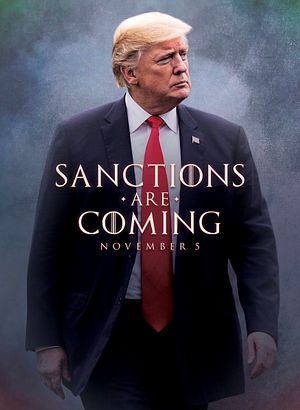President Trump appears to be excited about the imposition of a second round of sanctions on Iran that had been lifted as part of the United States’ participation in the 2015 Joint Comprehensive Plan of Action. At least that’s the impression given off by the president tweeting a stylized image, referencing the popular prestige television drama Game of Thrones, noting that “sanctions are coming” on November 5.
Indeed, on November 4, at 11:59 p.m. U.S. eastern time, the second 180-day wind-down period put in place by the U.S. Treasury Department will come to an end and onerous sanctions on Iran’s port operators, shipping sector, petrochemical and energy industries, and foreign financial transactions will take effect. The sanctions have been opposed by the other participating parties in the JCPOA, including the European Union, Russia, and China.
The Trump administration, however, has also decided to grant eight allied and partner countries with significant energy trading relationships with Iran waivers to the new sanctions that are set to go into effect. On Friday, U.S. Secretary of State Mike Pompeo announced that several states would receive waivers, without naming them.
According to local reports, the countries that appear to have been informed of waivers include South Korea, Japan, and India, among others. The official list of countries that have received waivers will be released on Monday as the new sanctions take effect. The European Union, notably, is not expected to receive a waiver. The waivers may be temporary and time-delimited to allow these states to lessen their reliance on Iranian oil.
“This part of the campaign is aimed at depriving the regime of the revenues it uses to spread death and destruction around the world, Pompeo said. “Our ultimate aim is to compel Iran to permanently abandon its well-documented outlier activities and behave as a normal country.”
India, Japan, and South Korea are all major importers of oil from Iran. As the Trump administration announced its decision to withdraw the United States from compliance with the JCPOA in May 2018, all three countries were among the top 10 importers, India in second, South Korea in third, and Japan in sixth.
Notably, China, the largest importer of Iranian oil, has not yet announced whether or not it has received a final waiver notification. As the clock ticks down, China’s receipt of a waiver will be an important determinant of just how seriously this new round of sanctions will hurt Iran and, consequently, the continued implementation of a U.S.-less JCPOA. Reuters cites one Chinese official as noting that talks are ongoing about a possible Chinese waiver, with a decision expected at the eleventh hour.
The problem with a sanctions waiver for China is broader than a question of the JCPOA alone and the effort to pressure Iran to change its behavior, as Pompeo noted. The United States and China are now in a broader period of geopolitical competition and squeezing Chinese imports of Iranian oil could yet be another bargaining chip for the United States in an effort to seek concessions from Beijing on other, unrelated issues.
What’s been interesting is recent moves by significant Chinese financial entities, including the Bank of Kunlun, that have announced that they would no longer conduct business with Iranian entities, in anticipation of the new round of U.S. sanctions. “Kunlun, the main official channel for money flows between China and Iran, has verbally informed clients that it will stop accepting yuan-denominated Iranian payments to China from Nov. 1,” Reuters reported in late-October.
If the U.S. ultimately rejects a Chinese waiver, it’s unclear how Beijing’s trade with Iran might shift. The maximalist outcome that the Trump administration might seek—a total shutdown overnight of Chinese energy trade with Iran—is unlikely. Instead, China may allow continued trade with Iran through smaller firms that would better be able to weather the costs of being cut off from the U.S. financial system.
But whatever China now does—and the U.S. decision on a waiver—is part of the broader strategic conversation between the two countries, where the top agenda item continues to be the trade war. Either way, don’t expect Iran to be high on the U.S.-China agenda when Trump meets Chinese President Xi Jinping later this month at the G20 meeting in Buenos Aires.

































